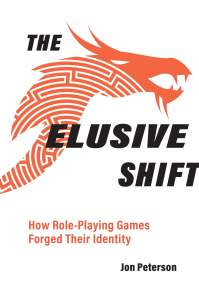In writing my review of The Game Wizards, I came to a horrifying realization – I hadn’t given my thoughts on the other previous sequel by Jon Peterson to Playing at the World that I’d read – The Elusive Shift. Considering that all three of these books kind of form a full narrative, I realized I really needed to rectify that situation. So I’m rectifying that situation.
So – Playing At The World basically covered everything that lead up to the creation of Dungeons & Dragons, and the things that influenced it – the wargaming culture that lead to the creation of the Braunstein, the various fantasy novels and comics that inspired influenced the first D&D games that the rules were born from – both Gary’s Grayhawk game and Dave’s Blackmoor game. The Game Wizards got into how the partnership between Dave & Gary more or less fell apart very quickly (Lennon & McCartney they were not), born out of egos – Dave’s arrogant belief that editors don’t actually do any work and that Gary hadn’t actually done anything (incorrect), and Gary’s belief that he had the vision to guide the future of Dungeons & Dragons and he didn’t need Dave’s for that (yes and no – or rather no and yes). The Elusive Shift instead takes a look at the growth of D&D, and how basically other collaborators and contributors took the game from the original three pamphlets into… frankly, something that changed Fantasy forever.
The book covers a few main tacks. Probably one of the biggest ones being the vital question that is not actually answered in the D&D rules – how the hell do you play this damn thing? Before you chuckle and think about how silly a question that is – take a look at an RPG corebook you own – ideally one from the ’90s or early ’00s, and take a look at the early chapters of the book. Odds are that there’s going to be a section in there going into what an RPG is and how you play it – possibly with an example of play. In the case of D&D, you started seeing examples of play as early as the Basic Set – leading to how the decision was made to do that (and, for that matter, to do the Basic Sets).
However, even more than that, you have further questions about how you run a game, philosophically. Do you let the players know the rules? If they know the rules, does it hurt their enjoyment of the game because they’ve started metagaming? If they don’t know the rules, do they feel that they’re having an unfair experience? Does it matter if the players feel it’s unfair? And what should the relationship between the players and the gamemaster be? Are they confrontational? Does the gamemaster play it strictly neutral, and let the dice fall where they may? or should the GM put a little English on things to make sure the players are having fun?
All of these debates were taking place throughout game stores and gaming conventions throughout the 70s. Even better, these debates were also taking place in the pages of numerous fanzines related to tabletop gaming that sprung up in the wake of D&D’s release. More than a few of these were particularly happening in the pages of Alarums & Excursions – an Amateur Press Association, a type of fanzine where in order to get a copy, you had to submit articles to it.
Also coming out these fanzines were a whole bunch of new classes that weren’t in the original pamphlet. Classes like the Cleric, the Thief, the Paladin, and others, some of whom would also be submitted to Dragon Magazine, and eventually be included in later rules supplements for the game.
The Elusive Shift covers all of these – with the same sort of exhaustive research that we got in Playing at the World & The Game Wizards. Further, since there’s a degree of light fan drama in all of this, this really helps keep the book from being dry. There’s none of the cut-throat corporate politics that were found in The Game Wizards. However, fan drama can still be plenty satisfying – and there’s certainly some here, with Gary sticking his toe in when it comes to various rule revisions, as well as with play philosophies.
It’s not as much of a clear narrative as The Game Wizards is, ultimately making for a book that is more of interest to people who are into the nitty gritty of how various elements in D&D came to be, making for something that’s less dry than Playing at the World. It’s a good compliment to the other two books, but it doesn’t stand alone as well as the other ones do. You don’t get the full story without it, but it’s also very much not the best place to start.
The Elusive Shift is available from Amazon and Alibris – buying anything through those links helps to support the blog.
If you enjoyed this blog post and would like to help to support the site, please consider backing my Patreon. Patreon backers get to access my reviews and Let’s Plays up to a week in advance.
If you want to support the site, but can’t afford to pledge monthly, please consider tossing a few bucks into my Ko-Fi instead.


